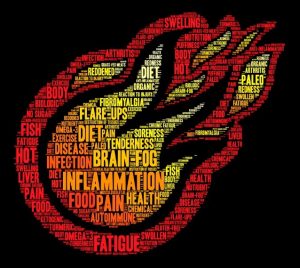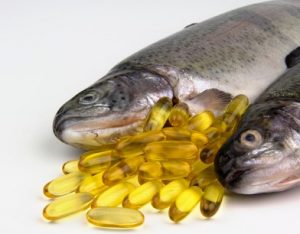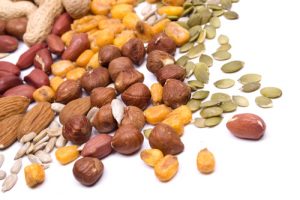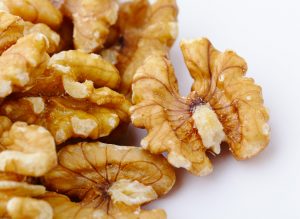Can Diet Douse The Flames?
Author: Dr. Stephen Chaney
 If you have arthritis, colitis, bursitis, or any of the other “itis” diseases, you already know that inflammation is the enemy. Chronic, low level inflammation is also a contributing factor to heart disease, cancer, and many other diseases. Clearly, inflammation is a bad actor. It is something we want to avoid.
If you have arthritis, colitis, bursitis, or any of the other “itis” diseases, you already know that inflammation is the enemy. Chronic, low level inflammation is also a contributing factor to heart disease, cancer, and many other diseases. Clearly, inflammation is a bad actor. It is something we want to avoid.
Obesity and diabetes are two of the biggest contributors to inflammation, but does diet also play a role? With all the anti-inflammation diets circulating on the internet, you would certainly think so. How good is the evidence that certain foods influence inflammation, and what does an anti-inflammatory diet look like?
The Science Behind Anti-Inflammatory Diets
 Let me start by saying that the science behind anti-inflammatory diets is nowhere near as strong as it is for the effect of primarily plant-based diets on heart disease and diabetes. The studies on anti-inflammatory diets are mostly small, short duration studies. However, the biggest problem is that there is no standard way of measuring inflammation.
Let me start by saying that the science behind anti-inflammatory diets is nowhere near as strong as it is for the effect of primarily plant-based diets on heart disease and diabetes. The studies on anti-inflammatory diets are mostly small, short duration studies. However, the biggest problem is that there is no standard way of measuring inflammation.
There are multiple markers of inflammation, and they do not change together. That means that in every study some markers of inflammation are altered, while others are not. There is no consistent pattern from one study to another.
In spite of these methodological difficulties, the studies generally point in the same direction. Let’s start with the strongest evidence and work our way down to the weakest evidence.
Omega-3 fats are anti-inflammatory (I. Reinders et al, European Journal of Clinical Nutrition, 66: 736-741, 2011). The evidence is strongest for the long chain omega-3s found in fish and fish oil, but the shorter chain omega-3s found in foods like walnuts, flaxseeds, chia seeds and flaxseed oil, soybean oil, and canola oil also appear to be anti-inflammatory.
Inflammation is directly correlated with glycemic index (L. Qi and F.B. Lu, Current Opinion in Lipidology, 18: 3-8, 2007). This has a couple of important implications.
The most straightforward is that refined carbohydrates and sugars (sodas, pastries, and desserts), which have a high glycemic index, increase inflammation. In contrast, complex carbohydrates (whole grains, most fruits and vegetables) decrease inflammation. No surprise there. The second implication is that it is the glycemic index, not the sugar, that is driving the inflammatory response.
That means we need to look more closely at foods than at sugars. Sodas, pastries and desserts are likely to cause inflammation, but sugar-containing foods with a low glycemic index are unlikely to be inflammatory.
Fruits and vegetables are anti-inflammatory. This has been shown in multiple studies. At this point most of the research is centered on identifying the nutrients and phytonutrients from fruits and vegetables that are responsible for the reduction in inflammation. I suspect the investigators are hoping to design an anti-inflammatory supplement and make lots of money. I will stick with the fresh fruits and vegetables.
Saturated fats are inflammatory. At face value, the data on saturated fats appear to be contradictory. Some  studies say that saturated fats increase inflammation, while others say they do not. However, similar to my earlier discussion on saturated fats and heart disease), the outcome of the study depends on what the saturated fats are replaced with.
studies say that saturated fats increase inflammation, while others say they do not. However, similar to my earlier discussion on saturated fats and heart disease), the outcome of the study depends on what the saturated fats are replaced with.
When saturated fats are replaced with refined carbohydrates, sugar and highly processed foods (the standard American low-fat diet), inflammation doesn’t change. This doesn’t mean that a diet high in saturated fat is healthy. It just means that both diets are bad for you. Both are inflammatory.
However, when saturated fat is replaced with omega-3 polyunsaturated fats (J.A. Paniagua et al, Atherosclerosis, 218: 443-450, 2011) or monounsaturated fats (B. Vessby et al, Diabetologia, 44: 312-319, 2001), markers of inflammation decrease. Clearly, saturated fats are not the best fat choice if you wish to keep inflammation in check.
I would be remiss if I did not address the claims by the low-carb diet proponents that saturated fats do not increase inflammation in the context of a low-carb diet. I want to remind you of two things we have discussed previously:
- The comparisons in those studies are generally with people consuming a diet high in simple carbohydrates and sugars.
- These studies have mostly been done in the short-term when the participants are losing weight on the low-carb diets. Weight loss decreases inflammation, so the reduction in inflammation on the low-carb diet could be coming from the weight loss.
The one study (M. Miller et al, Journal of the American Dietetic Association, 109: 713-717, 2009) I have found that compares a low-carb diet (the Atkins diet) with a good diet (the Ornish diet, which is a low-fat, lacto-ovo vegetarian diet) during weight maintenance found that the meat based, low-carb Atkins diet caused greater inflammation than the healthy low-fat Ornish diet.
Red meat is probably pro-inflammatory. Most, but not all, studies suggest that red meat consumption is associated with increased inflammation. If it is pro-inflammatory, the inflammation is most likely associated with its saturated fat, its heme iron content, or the advanced glycation end products formed during cooking.
What Is An Anti-Inflammatory Diet?
 Anti-inflammatory diets have become so mainstream that they now appear on many reputable health organization websites such as Harvard Health, WebMD, the Mayo Clinic, and the Cleveland Clinic. Each have slightly different features, but there is a tremendous amount of agreement.
Anti-inflammatory diets have become so mainstream that they now appear on many reputable health organization websites such as Harvard Health, WebMD, the Mayo Clinic, and the Cleveland Clinic. Each have slightly different features, but there is a tremendous amount of agreement.
Foods an anti-inflammatory diet includes: In a nutshell, an anti-inflammatory diet includes fruits and vegetables, whole grains, plant-based proteins (like beans and nuts), fatty fish, and fresh herbs and spices. Specifically, your diet should emphasize:
- Colorful fruits and vegetables. Not only do they help fight inflammation, but they are a great source of antioxidants and other nutrients important for your health.
- Whole grains. They have a low glycemic index. They are also a good source of fiber, and fiber helps flush inflammatory toxins out of the body.
- Beans and other legumes. They should be your primary source of protein. They are high in fiber and contain antioxidants and other anti-inflammatory nutrients.
- Nuts, olive oil, and avocados. They are good sources of healthy monounsaturated fats, which fight inflammation.
- Fatty fish. Salmon, tuna, and sardines are all great sources of long chain omega-3 fatty acids, which are
 incorporated into our cell membranes. Those long chain omega-3s in cell membranes are, in turn, used to create compounds that are powerful inflammation fighters.
incorporated into our cell membranes. Those long chain omega-3s in cell membranes are, in turn, used to create compounds that are powerful inflammation fighters.
Walnuts, flaxseeds, and chia seeds are good sources of short chain omega-3s. The efficiency of their conversion to long chain omega-3s that can be incorporated into cell membranes is only around 2-5%. If they fight inflammation, it is probably because they replace some of the saturated fats and omega-6 fats you might otherwise be eating.
- Herbs and spices. They add antioxidants and other phytonutrients that fight inflammation.
Foods an anti-inflammatory diet excludes: In a nutshell, an anti-inflammatory diet should exclude highly processed, overly greasy, or super sweet foods, especially sodas and other sweet drinks. Specifically, your diet should exclude:
- Refined carbohydrates, sodas and sugary foods. They have a high glycemic index, which is associated with inflammation. They can also lead to weight gain and high blood sugar, both of which cause inflammation.
- Foods high in saturated fats. This includes fatty and processed meats, butter, and high fat dairy products.
- Foods high in trans fats. This includes margarine, coffee creamers, and any processed food containing partly hydrogenated vegetable oils. Trans fats are very pro-inflammatory.
- French fries, fried chicken, and other fried foods. They used to be fried in saturated fat and/or trans fat. Nowadays, they are generally fried in omega-6 vegetable oils. A little omega-6 in the diet is OK, but Americans get too much omega-6 fatty acids in their diet. Most studies show that a high ratio of omega-6 to omega-3 fatty acids is pro-inflammatory.
- Foods you are allergic or sensitive to. Eating any food that you are sensitive to can cause inflammation. This comes up most often with respect to gluten and dairy because so many people are sensitive to one or both. However, if you are not sensitive to them, there is no reason to exclude whole grain gluten-containing foods or low-fat dairy foods from your diet.
Can Diet Douse The Flames?
 In case you didn’t notice, the recommendations for an anti-inflammatory diet closely match the other healthy diets I have discussed previously. It should come as no surprise then that both the Mediterranean (L. Gallard, Nutrition in Clinical Practice, 25: 634-640, 2010; L. Schwingshackl and G. Hoffmann, Nutrition Metabolism and Cardiovascular Diseases, 24: 929-939, 2014) and DASH (D.E. King et al, Archives of Internal Medicine, 167: 502-506, 2007) diets are anti-inflammatory.
In case you didn’t notice, the recommendations for an anti-inflammatory diet closely match the other healthy diets I have discussed previously. It should come as no surprise then that both the Mediterranean (L. Gallard, Nutrition in Clinical Practice, 25: 634-640, 2010; L. Schwingshackl and G. Hoffmann, Nutrition Metabolism and Cardiovascular Diseases, 24: 929-939, 2014) and DASH (D.E. King et al, Archives of Internal Medicine, 167: 502-506, 2007) diets are anti-inflammatory.
Vegan and vegetarian diets also appear to be anti-inflammatory as well. The anti-inflammatory nature of these diets undoubtedly contributes to their association with a lower risk of heart disease, diabetes, and cancer.
As for the low-carb diets, the jury is out. There are no long-term studies to support the claims of low-carb proponents that their diets reduce inflammation. The few long-term studies that are available suggest that low-carb diets are only likely to be anti-inflammatory if vegetable proteins and oils replace the animal proteins and fats that are currently recommended.
What does this mean for you if you have severe arthritis or other inflammatory diseases? An anti-inflammatory diet is unlikely to “cure” your symptoms by itself. However, it should definitely be a companion to everything else you are doing to reduce inflammation.
The Bottom Line
If you have arthritis, colitis, bursitis, or any of the other “itis” diseases, you already know that inflammation is the enemy. Chronic, low level inflammation is also a contributing factor to heart disease, cancer, and many other diseases. Clearly, inflammation is a bad actor. It’s something we want to avoid.
Obesity and diabetes are two of the biggest contributors to inflammation, but does diet also play a role? With all the anti-inflammation diets circulating on the internet, you would certainly think so. In this article I review the evidence that certain foods influence inflammation and describe what an anti-inflammatory diet looks like.
For more details read the article above.
These statements have not been evaluated by the Food and Drug Administration. This information is not intended to diagnose, treat, cure, or prevent any disease.





